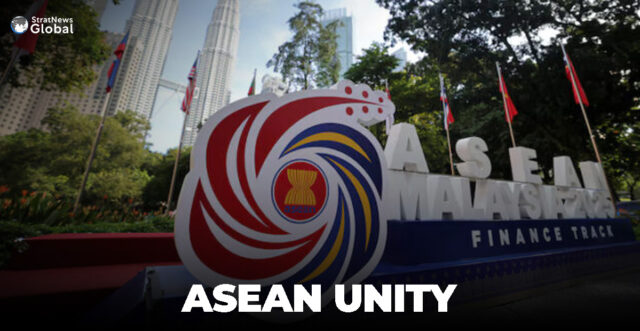Malaysia’s Prime Minister Anwar Ibrahim on Wednesday called on Southeast Asian nations to act decisively and boost trade within the region, as ASEAN foreign ministers gathered amid fresh concerns over Trump’s trade tariffs and growing global uncertainty.
Anwar, addressing ministers of the 10-member Association of Southeast Asian Nations, described tariffs, export restrictions and investment barriers as “the sharpened instruments of geopolitical rivalry”. He did not mention the United States specifically.
‘Need To Fortify Our Internal Foundations’
“As we navigate external pressures, we need to fortify our internal foundations. Trade more among ourselves, invest more in one another, and advance integration across sectors with resolve,” he said.
“As global conditions remain uncertain, there is no overstressing the need to act with purpose in our own region.”
Trump’s Hefty Levies
US President Donald Trump on Monday announced hefty levies, opens new tab of between 25% and 40% on six Southeast Asian countries, despite concerted efforts by some to offer broad concessions and negotiate lower rates.
The export-reliant ASEAN is collectively the world’s fifth-biggest economy, with some members beneficiaries of supply chain realignments from China. Only Vietnam has secured a deal, which lowers the levy to 20% from 46% initially.
Indonesia, Thailand and Malaysia are seeking further talks ahead of the tariff implementation on August 1.
The Kuala Lumpur meeting will see ASEAN engage with key trade partners like the US, China, Japan, Russia, India, and the EU. From Thursday, China’s Wang Yi, Russia’s Sergei Lavrov, and US Secretary of State Marco Rubio — on his first Asia visit — are expected to join, aiming to ease tensions over Trump’s tariff policies.
Tariffs To Cause ‘Economic Fragmentation’
ASEAN foreign ministers will express “concern over rising global trade tensions and growing uncertainties in the international economic landscape, particularly the unilateral actions relating to tariffs”, according to a draft joint communique seen by Reuters.
The draft, dated July 7 and before the latest tariff rates were announced, did not mention the United States and used language similar to an ASEAN leaders’ statement in May. Both said tariffs were “counterproductive and risk exacerbating global economic fragmentation”.
In April, ASEAN said it won’t retaliate and assured that any trade deals with Washington won’t hurt other members. OCBC economist Lavanya Ventakeswaran noted that countries like Vietnam now face more uncertainty due to US tariffs on transshipments, mainly targeting Chinese goods, with doubts over how they’ll be enforced.
“The bottom line is that it’s going to be quite complicated moving forward,” Ventakeswaran said.
Cambodia-Thailand Dispute
Trump’s earlier threat of an extra 10% tariff on BRICS-aligned nations has added to ASEAN’s trade concerns, especially for members like Indonesia and partners like Malaysia, Thailand, and Vietnam.
Meanwhile, ASEAN is pushing for a Southeast Asia nuclear weapons-free zone, with hopes that the meet will also help ease Thailand-Cambodia border tensions that have triggered a political crisis in Bangkok.
Thai Prime Minister Paetongtarn Shinawatra has been suspended pending a court case over her leaked phone call with Cambodia’s influential former leader, Hun Sen, a conversation her opponents say undermined Thailand’s sovereignty and integrity.
The dispute puts more pressure on ASEAN to maintain a united front, amid other unresolved issues including an intensifying civil war in Myanmar and a protracted drafting of a code of conduct with Beijing for the South China Sea, a key source of geopolitical tension.
Malaysia’s Foreign Minister Mohamad Hasan on Wednesday urged all groups in war-torn Myanmar to create a conducive environment for an election.
It was not immediately clear if his remarks indicate ASEAN chair Malaysia will endorse the election, which critics have derided as a sham to entrench military rule in the absence of opposition parties.
(With inputs from Reuters)





